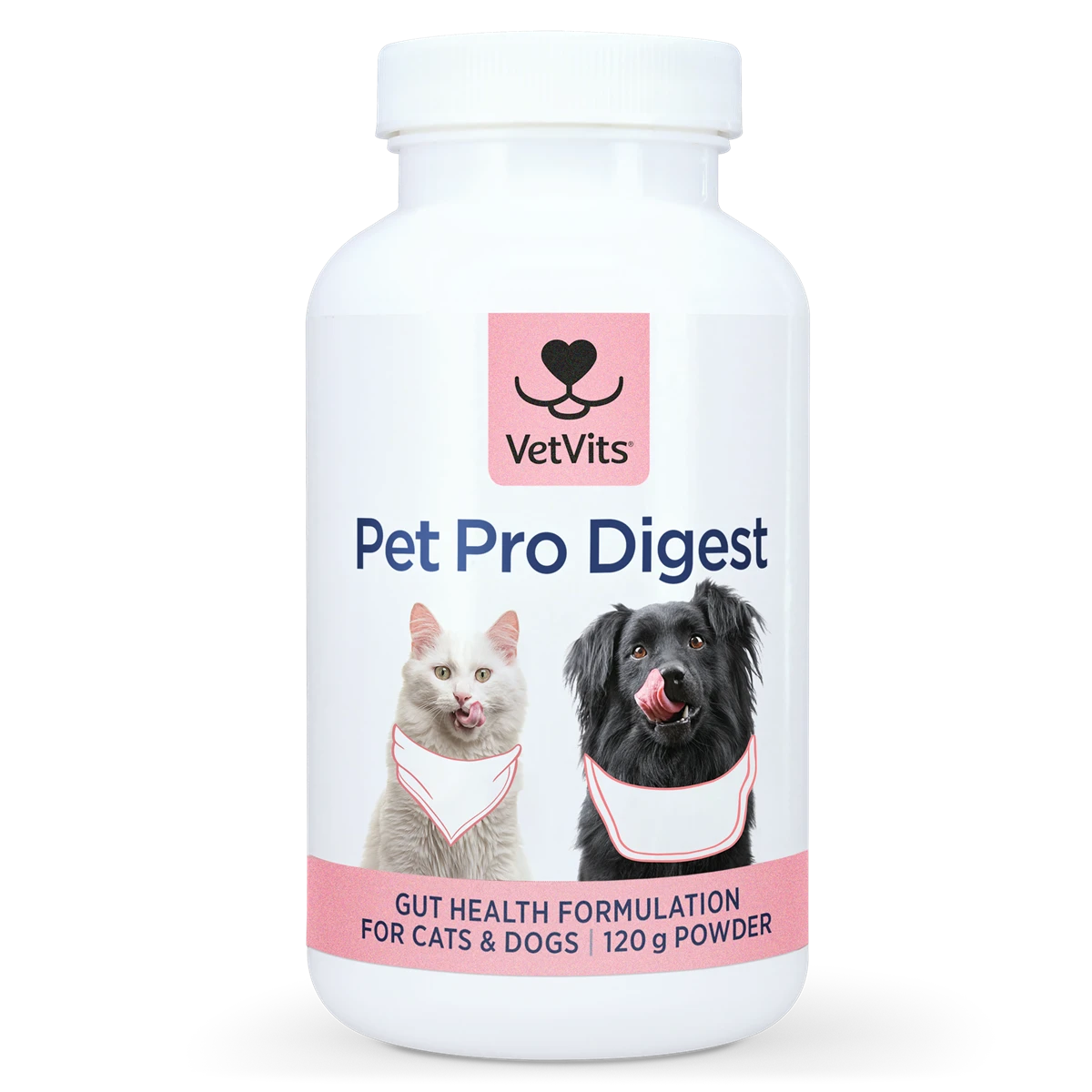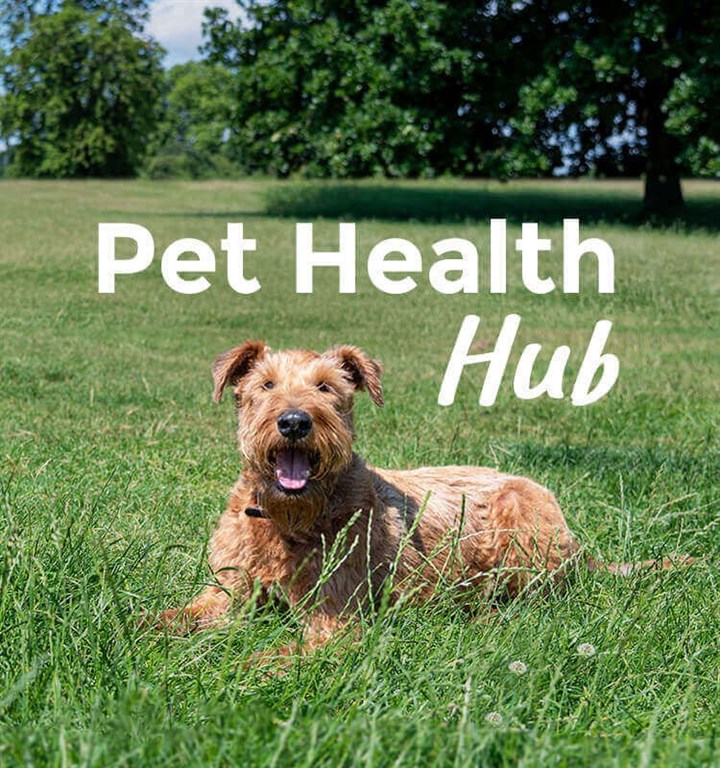As pet owners, we get to know our animals in such a personal way. We pick up on their little habits - the excited tail wag when it's walk time, the satisfied purr after a good meal, and, of course, those off moments when something isn't quite right. Maybe your dog seems a bit flat. Maybe your cat left a mess you weren't expecting. These are often their way of telling us: "Hey, my tummy's not feeling great."
🕒 6 min read
Most people view digestion as a basic process because when animals consume food, the digestive system operates automatically. A complex microorganism community called the microbiome exists within your pet's internal digestive tract. The gut contains trillions of tiny microbes, including bacteria and fungi, which function together as a system. When your pet's systems operate harmoniously, they experience high energy levels, comfort, and happiness.
Your pet's digestive system does more than break down nutrients from food. The gut supports immune system strength while controlling stress levels and influencing mood patterns. A healthy gut can improve overall health and happiness in your dog or cat.
The guide provides essential information to help you maintain the health of your dogs' and cats' digestive systems. The following sections explain how you can support their gut health and general well-being.
Understanding Gut Trouble in Dogs and Cats
To support your pet's gut health, you must aim for equilibrium. A diverse and thriving microbiome allows beneficial bacteria to control less beneficial microorganisms properly. Disrupting balance in your pet's gut can lead to dysbiosis, which produces fast-occurring problems.
These signs indicate that your pet's gut is out of balance:
- Loose stools or diarrhoea
- Constipation or difficulty going
- Excess gas or bloating
- Vomiting (including frequent hairballs in cats)
- Dull coat or itchy, flaky skin
- Low energy or fatigue
- New or worsening food sensitivities
What causes gut imbalance?
The main factors leading to gut imbalance include taking antibiotics, as well as experiencing stress and making sudden dietary changes. Antibiotics provide necessary medical benefits, destroying harmful microbes but also beneficial bacteria that we need. Stress is another significant factor. Changes in routine, travel, or a new pet in the home can all cause your pet and their gut distress. You might be unaware that the most frequent reason for gut imbalance is actually a quick food transition. They should occur at a gradual pace so that the digestive system of your pet does not experience a major disruption. This rapid change can really disrupt the gut's natural balance.
Probiotics, Prebiotics, Postbiotics: What They Are (and Why They Matter)
When your pet experiences stomach sensitivity, antibiotic complications, or lacks energy, their gut health could be the underlying cause. You may have heard about probiotics, prebiotics, and postbiotics, but their specific functions and significance in supplements remain unclear. The three components operate together in a simple yet effective method to support your pet's complete health from inside their body.
Next, we'll explore the definition and significance of each component for maintaining your dog or cat's wellness:
1. Probiotics: Rebalancing the gut when things go off track
Your pet's gut contains probiotics, friendly bacteria that naturally exist to maintain digestive health. The helpful bacteria that live in your pet's gut become disrupted when antibiotics are used, a diet change occurs, or when stress happens, or your pet ages. Probiotic supplements restore gut harmony by introducing beneficial bacterial strains that support digestive health, help control mood, and enhance immune function. This practice serves two functions: it resolves digestive problems while allowing your pet to regain their normal condition.
2. Prebiotics: Fuel for beneficial bacteria
Prebiotics serve as the fibre that provides nutrition to probiotic bacteria, whereas probiotics consist of the beneficial bacteria. Your pet's digestive system cannot process these specific fibres, so the beneficial bacteria perform the breakdown. The helpful microbes require prebiotics as their constant food source for growth and active operation to establish a protective digestive balance against inflammation and infections. The consumption of prebiotics enables your pet's digestive system to support diverse microbial communities in their gut, which maintains their immune system and digestive functions.
3. Postbiotics: The results of a healthy gut
When beneficial bacteria transform prebiotics, they produce postbiotics, which possess significant power. The most essential compounds produced during gut fermentation are short-chain fatty acids (SCFAs) that shield the gut lining and fight inflammation while boosting the immune function system-wide. The actual health advantages emerge from postbiotics following the setup provided by probiotics and prebiotics. Your pet's gut bacteria show evidence of survival through postbiotics while providing digestive benefits, system resistance, and health.
All in all, probiotics work together with prebiotics and postbiotics to form a robust digestive ecosystem that affects nutritional absorption and daily well-being in pets. A comprehensive support of the three components provides your dog or cat with the necessary tools to achieve lasting gut health and overall wellness.
How to Support Your Pet's Gut Health at Home
Let's look at how you can naturally aid your pet's digestive health:
1. Start with their diet
What's in their bowl really matters. A good, balanced diet sets the stage for everything else. If your pet's been having tummy trouble, it might be time to take a closer look at what they're eating. Are they getting the nutrients they need? Is the food gentle enough on their system?
And if you do need to switch things up, go slowly. Mix the new food in with the old over about a week. Rushing the change can throw their gut into chaos, and no one wants that.
2. Add a little extra support
Sometimes, diet alone isn't quite enough, especially if your pet's been on antibiotics, has a sensitive stomach, or just needs a bit of extra help. That's where a supplement can really make a difference.
We created Pet Pro Digest with that in mind. It's not just one ingredient doing all the work. It's a full blend: live probiotics to restore balance, prebiotics to feed the good bacteria, and calming ingredients like slippery elm and bentonite clay to soothe the inside. It's simple, gentle, and made to actually help.
3. Don't forget the little things
Stress, excitement, and changes in the household can all cause stress to your dogs or cats' digestive systems. They really do feel it. So, make sure to keep their routine as steady as you can. Ensure they've got a quiet place to relax, clean water nearby, and regular walks or play. It doesn't have to be perfect, just consistent and calm.
Gut health extends beyond the production of firm stool into a comprehensive system that can benefit your pet's overall wellness. Your pet's energy levels, comfort, and sense of happiness depend on this support. Your support enables your pet to maintain immunity and emotional well-being. We all want our pets to experience good health and thrive while spending their lives by our side.
Discover VetVit's expert-formulated dog supplements and cat supplements to promote joint health, digestion, and immune support. Browse our complete collection of trusted pet health products for dogs and cats now.
Pet Pro Digest
Daily probiotic support for dogs and cats | High in fibre | Supports gut balance and dental health | With advanced live cultures
- Probiotic blend for digestive balance
- High in fibre to support healthy stools
- Supports dental hygiene and gut flora

